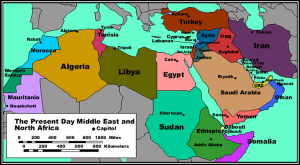 There are big opportunities for Italian investors in the Middle East and North Africa (MENA) markets, specially in the fields of electronics, construction, mechanics, electrical, components, and aeronautics. The North Africa and United Arab Emirates Forum took place at Rome Chamber of Commerce by Unicredit and Network Globale, a Rome-based agency that helps companies to internationalize their businesses. The leading MENA country in terms of foreign investment is Saudi Arabia, with 28.9 billion euros invested in 2013, followed by the UAE (8.7 billion), Algeria (3 billion) and Morocco (2 billion). MENA countries with the least foreign investment are Libya and Tunisia, according to Network Globale.
There are big opportunities for Italian investors in the Middle East and North Africa (MENA) markets, specially in the fields of electronics, construction, mechanics, electrical, components, and aeronautics. The North Africa and United Arab Emirates Forum took place at Rome Chamber of Commerce by Unicredit and Network Globale, a Rome-based agency that helps companies to internationalize their businesses. The leading MENA country in terms of foreign investment is Saudi Arabia, with 28.9 billion euros invested in 2013, followed by the UAE (8.7 billion), Algeria (3 billion) and Morocco (2 billion). MENA countries with the least foreign investment are Libya and Tunisia, according to Network Globale.
”Last year, Italy invested more than one billion euros in Saudi Arabia alone”, said Nigel Marco Zanenga, Morocco and Tunisia delegate for Italy’s global financial services company UniCredit Group. ‘‘There are 1,400 Italian businesses now operating in the MENA area, of which 745 in Tunisia, 100 in Morocco, 158 in Algeria, 140 in the UAE, 40 in Saudi Arabia, 25 in Qatar and 11 in Libya. But the ones active in the area are far more: 5-6,000 operational presences”, Zanenga added. Italy could do better in the Maghreb, beginning with Morocco, whose GDP has grown at a fast-paced 4-5% a year, from $99 billion in 2011 to an estimated $108 billion in 2014, according to UniCredit. The sectors to bet on in Morocco are offshoring, space and aeronautics, automobiles, electronics, leather, and textiles.
UniCredit recommends also Tunisia, whose GDP has grown from $45.9 billion in 2011 to an estimated $50.6 billion in 2014. ”They have a better operational context than Morocco and some interesting sectors including electronics, construction, mechanics, electrical, components, and aeronautics’‘, Zanenga remarked. Investors should not overlook Libya, in spite of its unstable political and security climate, according to UniCredit Liaison Office chief Giovanni Giacomazzi. The numbers point to a wavering GDP that went from $70 billion in 2012, to $54 billion in 2013, to an estimated $53 billion this year to the $64 billion forecast in 2015.
In the Middle East, the UAE benefits political and financial stability. ‘‘They have a highly competitive market, and are very active among Gulf Cooperation Council member countries”, pointed out Lorenzo Bagnoli, who is the general manager of Diacron consulting company. ”They make an excellent basis from which to expand into neighboring as well as Asian countries, especially in view of the 2020 world’s fair, a key event that will be a launching pad for the emirates”, he added.



